The
Sacramental Nature of the Proclamation of the Word of God
Listening
to the Word is epitomised in the word “Manducatio”
(Latin) or
"Manducation", which
is an obsolete word that means
"the taking of food", to consume the Word, chew, eat,
ruminate, digest, intake.
“Manducation”
is used in monastic theology,
and refers to the full operation of eating the Word of God, the
English equivalent being “ingestion”.
This
operation is a sacred operation for when Jesus wants to talk to us He
gives us a Word. His Words are Spirit and Life, Holy Spirit and
Divine Life. Receiving this Word is therefore a sacred operation. In
the most recent theological thought and in the Magisterium we
often find underlined the Sacramental dimension of the manducatio
of the Word of God.
Listening
to the Word of God at Mass - during the Liturgy of the Word and
thereafter through the Daily Readings – is, consequently, a
sacramental operation. In any sacrament, we have at least two
dimensions: the visible Sign used (ie. water, wine, oil,...) and the
invisible Grace. In the case of the ingestion of the Word of God
(liturgically) we also have two dimensions: 1- The letter or literal
meaning of the text, audibly proclaimed and 2- The invisible Word
that Jesus utters. The Risen Lord, present among us uses one of the
words of these texts, or an expression or a verse to talk to us, to
say something to us, to give us a Word. The operation is like the
Eucharist where the breaking of the Bread of His Word also takes
place.
In
this sacred operation and sacrament, the golden thread of the
Communication of the Grace of God is an intelligible one. The words
that are proclaimed are words that we are supposed to grasp with our
mind, and the Word that the Lord will pronounce, even if it is
sacred, will use our mind, lifting it up, and nourishing it with
God's Light and Love. Other Sacraments, the normal seven sacraments -
except Confession - have a more reduced use of the mind and a greater
use of the symbol (Water, Oil, Bread, Wine,...). These other
sacraments (except Confession) may talk essentially more to the
depths of our being (the spirit) which is a supra-conscious area
(above consciousness) rather than the conscious mind.
The
Sacramental Dimension of the Process of Listening to the Word of God
The
operation of the manducation of the word of God, having to
deal with the human mind throughout, faces various challenges and
temptations that can become obstacles. Why so? It is very important
to notice that in modern times the Church has to clearly define the
co-existence in the Bible of two authors: the Divine Author of the
entire Bible who inspired all the words and who inspired only the
words that God wanted the human authors to put down, and the said
human authors who used their individual styles, capacities, talents,
experience in order to write the sacred texts under the inspiration
of the Holy Spirit. The existence of the human authors and a correct
understanding of the Catholic Theory of Inspiration of the Bible led
the Church to impel exegetes to study the human authors, their
literary styles, intentions, tools,... in order to fully understand
the text.
The
science of exegesis was dedicated for more than 150 years to this
study. The analysis of the texts with all scientific tools available
to understand its letter or literal meaning was deployed with great
energy and enthusiasm. As a result many studies and monographic works
were written to explain each book of the Bible. All human industry
was involved in this endeavour. As a result, often the researcher and
writer as well as the reader have the impression of knowing the ins
and outs of each book. All this effort can only be praised. It is
needed and we can never afford to have the Bible in our hands without
using these results, particularly the soundest ones.
Now,
if we come back to the sacramental operation of the manducatio
of the the Word of God, we will find that two movements are needed:
1- explained in the one described above: understanding the text in
its context, understanding the intent of the Author, and the tools
and ways he used these in order to express it. 2- the need to lift up
the mind, to focus the mind (our inner ear) on the Divine Author, on
the Risen Lord who wants to talk to us.
The
first operation is realised through the natural light of reason and
at the most with the general help of the Grace of God, the general
Light of Faith.
The
second operation can only be achieved with the specific help of the
Grace of God, ie. the direct and personal intervention of the Holy
Spirit in us, facilitating the communication (or coming) of the Word
of Jesus in us.
The
pitfall that any believer can fall into is to reduce or transform the
operation of listening (manducatio) into the first operation:
understanding the text, and extracting from it all that a serious
intelligent study can offer. After completing this first action and
thinking that he knows by then the ins and outs of the text, he or
she will hit the "bottom" of the Word (see drawing)... will
block the Sacramental operation, will make the text opaque and not
transparent.
If
we were to use the image of stained glass, we can say that focusing
on the strictly literal meaning, thinking that we possess the ins and
outs of it, is like focusing only on the pigment of a pane of stained
glass. There is no vision of the essence of the stained glass, there
is no vision of the light that comes through it. The excessive focus
only on the stained glass itself, the closeness of our attention to
it, makes it paradoxically opaque. It ends up by blocking the Word
that comes from God through the literal meaning of the text.
The
study of the text in this way, the study of the human author instead
of remaining open to God, to the Divine Author, imprisons the human
understanding of it, enclosing the text in the human comprehension of
the mind. It puts the Divine Author into the shade and makes Him
vanish. The sacred operation of listening, ingesting the Word ,cannot
take place.
Thus
the act of faith in the Word is improperly done, it ends at the
bottom of the text instead of ending at Jesus' Mouth so to speak.
Catholic
Theory of Inspiration
Here
is the correct expression of the catholic theory of inspiration:
"For, by supernatural power, He so moved and impelled them to
write - He was so present to them - that the things which He ordered,
and those only, they, first, rightly understood [use
of the mind], then willed
faithfully [use of the will]
to write down, and finally expressed [art
of expressing] in apt words and with infallible truth.
Otherwise, it could not be said that He was the Author of the entire
Scripture." (Pope Leo XIII, "Providentissimus Deus",
20) It is because the Holy Spirit was capable of elevating their
minds and moving them, moving their will, helping them in the art of
choosing, that God is the Author.
If
we understand properly the catholic theory of inspiration, we will
understand how the Holy Spirit inspired the human authors, guided
their minds to choose the words He wanted, moved their wills to
choose them and help their judgement, to choose the words and only
those words that God wanted. Understanding properly how God is the
Real Main author of the Bible and in which exact sense the human
author is author, is to see the exact interaction between the Holy
Spirit and the different faculties of the human author, to adjust
thoroughly our act of faith in the Word of God that we read, and to
show us how it is as bottomless as stained glass is. It shows the
exact perspective from which the study of the human author must be
viewed as this will determine the contours of the Word of God, and
will avoid the “bottom” or basic meaning (see drawing below). In
sum, if we study the limits of each piece of the stained glass we are
in fact studying its human expression. But it is God from within, or
the light from behind, that illumines the Text, makes it alive, makes
it Sacramental, ie. under the Power of the Action of the Holy Spirit,
here and now, every time the Sacrament is given (every time the Word
is proclaimed and afterward “manducated” during Lectio
Divina).
Conclusion
When
practising Lectio Divina, we need first to understand the
text, and we cannot avoid this step. The material aspect of the Word,
the text, the material aspect of the Sacrament has to be laid down,
explained, understood.
As
a second stage, one has to allow a sacramental "distance"
with the Text in order to listen through/to, to read through it,
exactly as we would do with a beautiful pane of stained glass. After
having contemplated the beauty of the craftsmanship, we will need to
go back a few meters, lift our gaze to the entire stained glass
window and see through it the light, the reflections that it offers
to the Divine Light of the Risen Lord. Only under these conditions
can the Lord talk to us.
Our
Act of Faith in the Word we read could be weakened by attending at
length to the exegetical explanations offered by serious studies. We
could then have the impression of understanding the text, its ins and
outs, and end up by hitting an opaque wall (the bottom of the Sacred
Text) instead of renewing our Act of Faith in the Fact that these
Words are inspired by God and that therefore their limits are God's
limits, that their "bottom" so to speak is God himself,
Jesus himself who inspired them and who wants to talk to us.
We
are therefore invited to go from, first, a human understanding (at
most with the general help of the Light of Faith) to a divine
knowledge directly and personally given to us by the Holy Spirit,
here and now, that does not come to us aside from the letter of the
text, but through it, exactly as the Light does with the Stained
Glass. The correct sacramental balance here between the Letter and
the Spirit, between the limits that the letter offers (only a
contour) and the amazing new depths that God can offer to it here and
now, is achieved!
It
is never a choice between the Letter and the Spirit. It is a choice
not to remain imprisoned in the letter, but seeing that the letter
has an opening toward God, allowing the Risen Lord here and now to
talk to us.
It
is never a matter of twisting the letter to our liking. It is never
taking under our control the letter, trying to guess what the Lord
wants to say. It is about doing a vigorous act of Faith in God who
inspired this letter, and who is present here and now and capable to
make it alive today in a unique way, so it becomes real food for all
of our being and not a purely intellectual endeavour.
As
we can see, the correct understanding of the catholic theory/notion
of inspiration with its delicate divine vertical balance between the
Divine Author and the human author, offers the only way for a
Sacramental Manducation of the Word of God.
If
any of the authors is misunderstood, or if the relationship between
the two authors is misunderstood, our act of Faith during the
Proclamation of the Word and during the Lectio Divina Manducation
will be blocked and the Grace of God will not be "triggered"
and will definitely not come through.
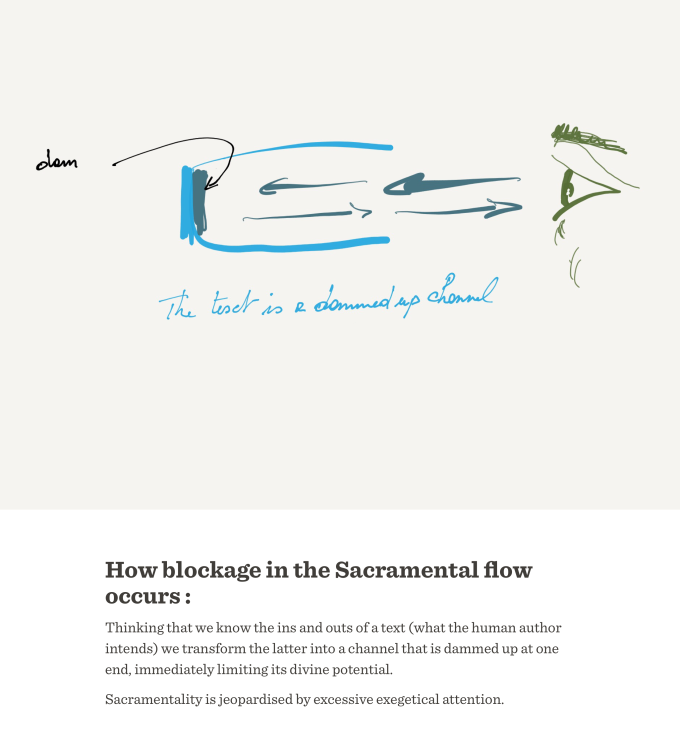
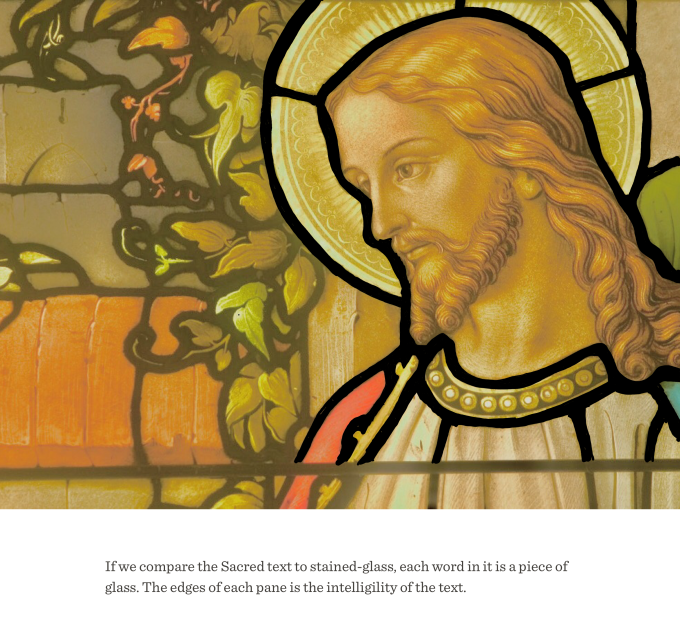
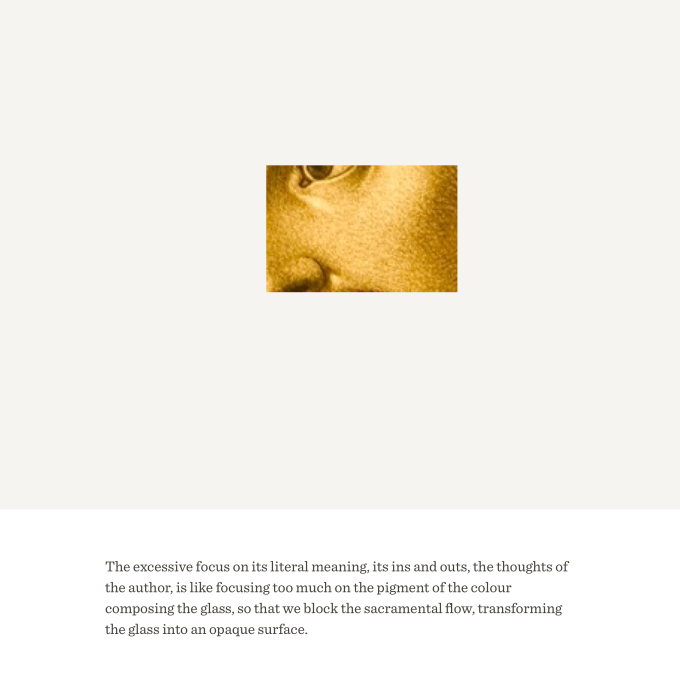
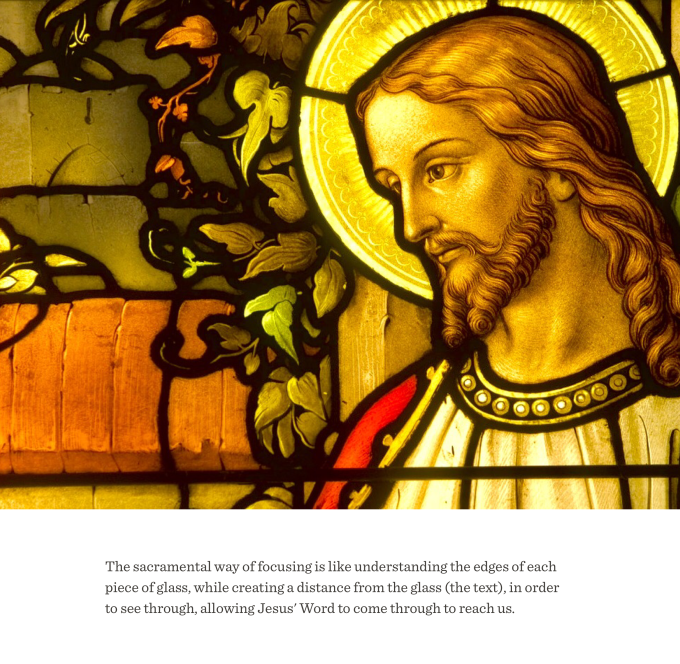
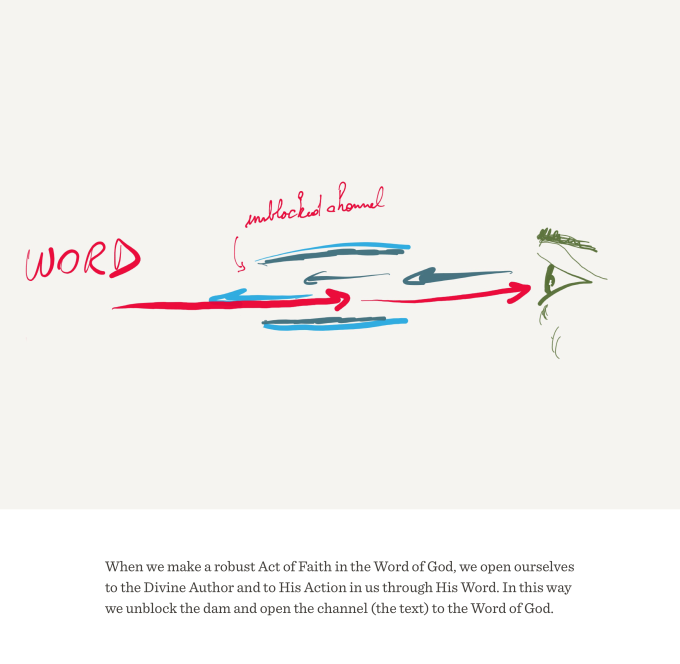
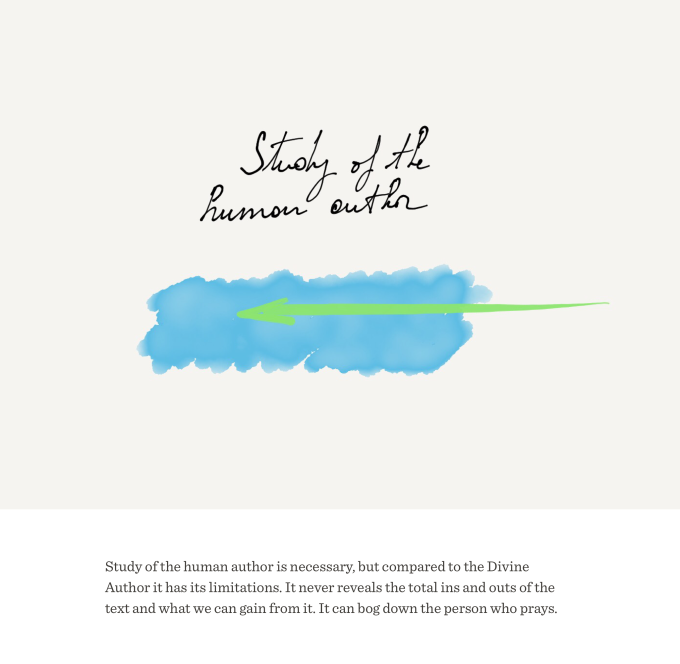
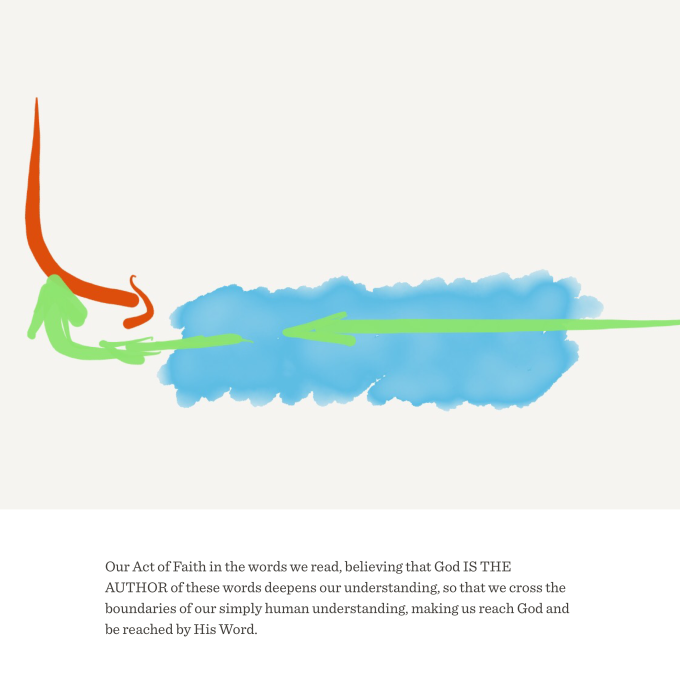
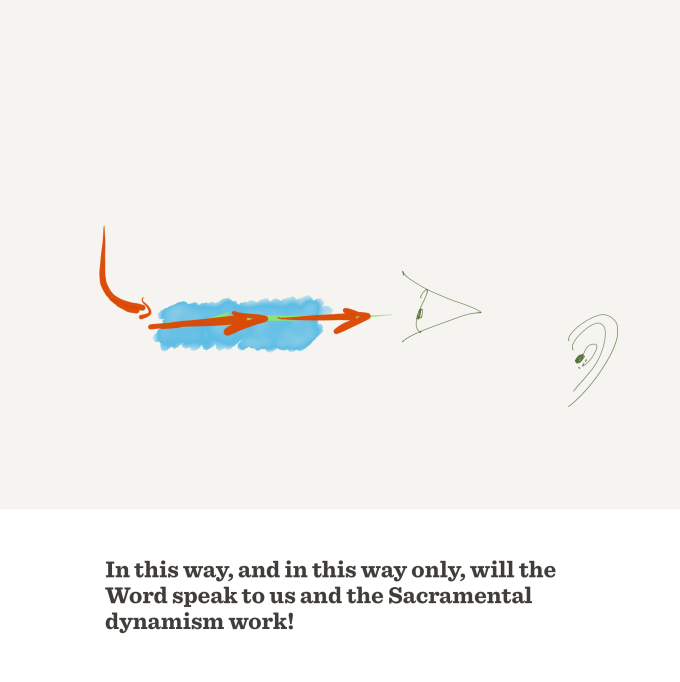

No comments:
Post a Comment